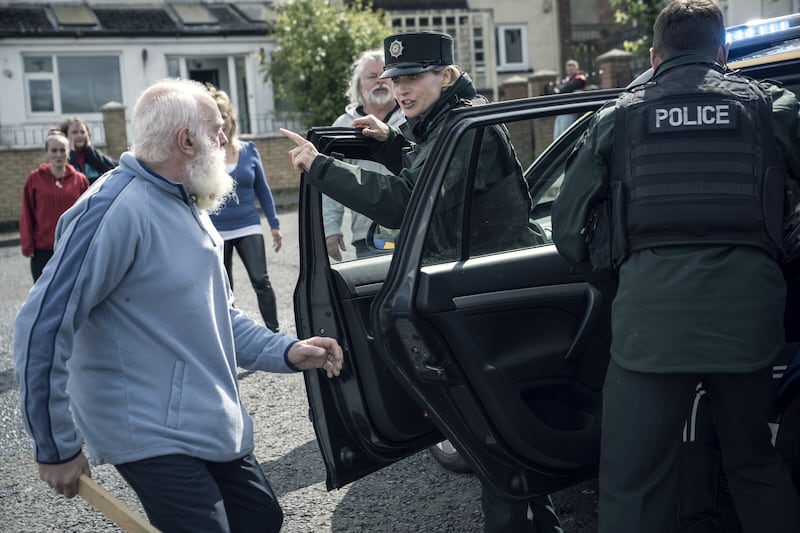
THERE have been crime serials shot in Belfast before - Line of Duty, Marcella, The Fall to name but three - but the upcoming new six-part cop drama Blue Lights is the first to zero-in on the confrontation-packed, sectarian tensions-charged work of a recognisably realistic Police Service of Northern Ireland.
Created and written by former BBC Spotlight and Panorama journalists turned screenwriters Declan Lawn and Adam Patterson (The Salisbury Poisonings), the show centers on a selection of new PSNI recruits serving their probation on the Belfast beat beside more experienced partners: Grace (Sian Brooke) is 41, English, and has just changed careers to become a police officer, while Annie (Katherine Devlin), Tommy (Nathan Braniff) and Jen (Hannah McClean) are wide-eyed 20-something hopefuls whose backgrounds span the religious and class-based divides so familiar to the north.
All are wet-behind-the-ears and struggling to remember the law while also learning the 'unwritten rules' key to survival on Belfast's most hostile-to-police streets under the guidance of experienced coppers like Stevie (Martin McCann), Gerry (Richard Dormer) and Helen (Joanne Crawford), who have developed the cynicism and gallows humour of veterans.
In the first episode alone, the raw recruits receive a convincing west Belfast welcome of eggs, bottles and bricks while on duty in a republican estate, and one unlucky cop gets assaulted as they try to carry out a 'stop and search'. The perpetrator is eventually arrested, but manages to exploit procedural errors to walk free.
"Never forget - some of these f***ers know the law better than we do," admonishes a superior officer.
He adds: "But don't worry, we will get that wee b****** in the long grass."
However, it quickly becomes apparent that undercover British spooks operating in the area - nicknamed the 'sneaky beakies' by the cops - may have other plans that will interfere with the proper application of justice.
Hope Street this ain't.
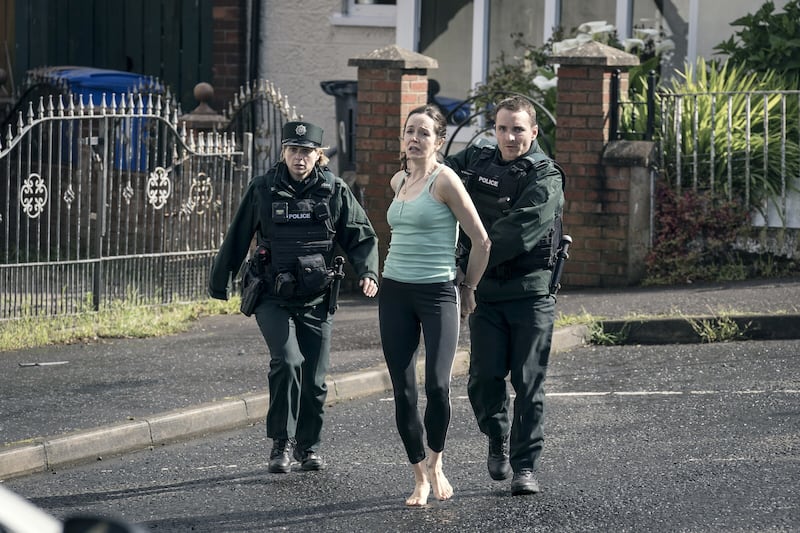
"To make a creative product about your home, I think, is the toughest challenge we've ever faced - not least because we have to live here after it goes out," says Blue Lights writer and co-creator Adam Patterson on reaching for realism within the show and its characters.
"Belfast is complicated. It's a place we love, and yet detest at times. We purposely built these characters so that they're not easily disseminated. I think if you do that and build the show that way, it allows people to identify things they would otherwise reject, because we prefer as a society to see things as either 'good' or 'bad'.
"Through the series, you'll find that, even with some of the people you really want to hate, you'll start to understand them. I'm not saying you'll like them, but you'll start to understand them and what they do. And some of our 'good' cops also make mistakes."
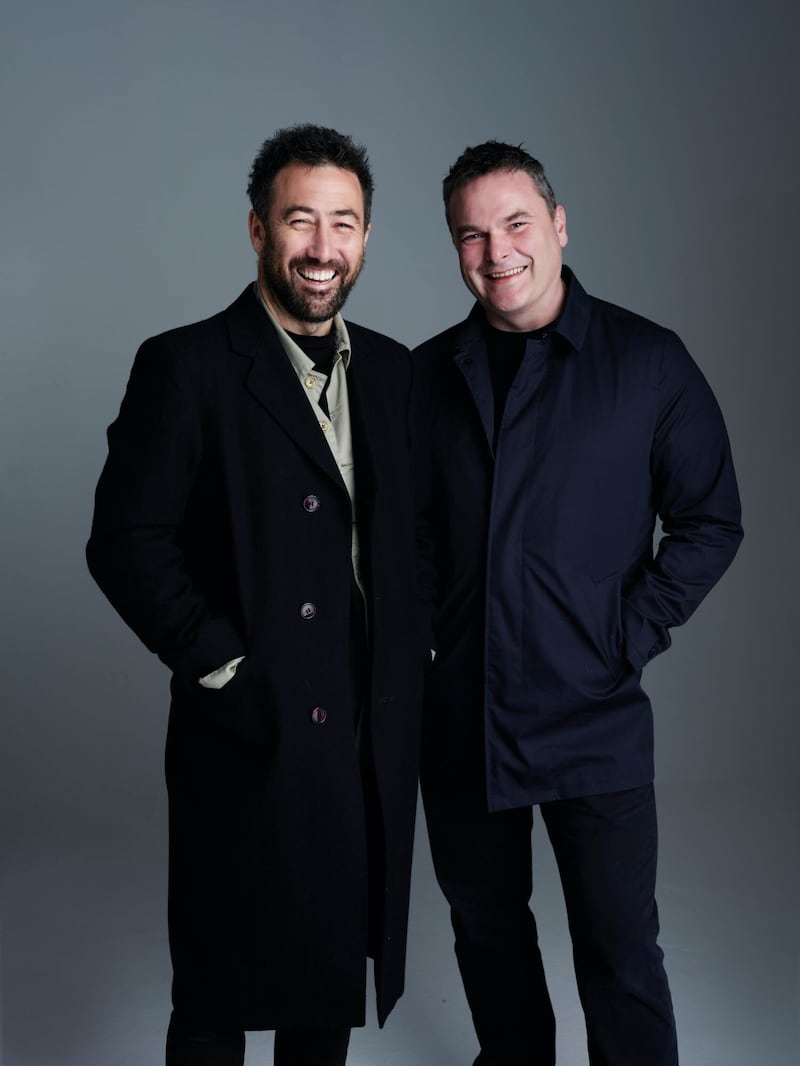
While it's immediately apparent that Blue Lights is no PSNI-endorsed recruitment ad for policing, it does strive to reflect a reality in which cops' lives are still very much under threat from dissidents - as evidenced by the attempted murder of Detective Chief Inspector John Caldwell last month.
"It's not like being a cop in England," explains Declan Lawn, who says that he and Patterson went on ride-alongs with PSNI patrols and interviewed officers while researching the show in order to try and capture the specifics of policing in Northern Ireland.
"The danger doesn't end at the end of your shift - you bring it home with you. There's a hyper-vigilance there, and it's a burden that your family has to accept. There is some kind of quotidian everyday heroism in getting up to do that every day. And so we felt that we had to get that across.
"But while there was a police advisor on the show, I would describe our relationship with the police as 'cordial but arms-length'. They let us use the PSNI name and crest and we were allowed to film at the Garnerville training academy - but they never saw a script, nor would we ever offer to let them see one."
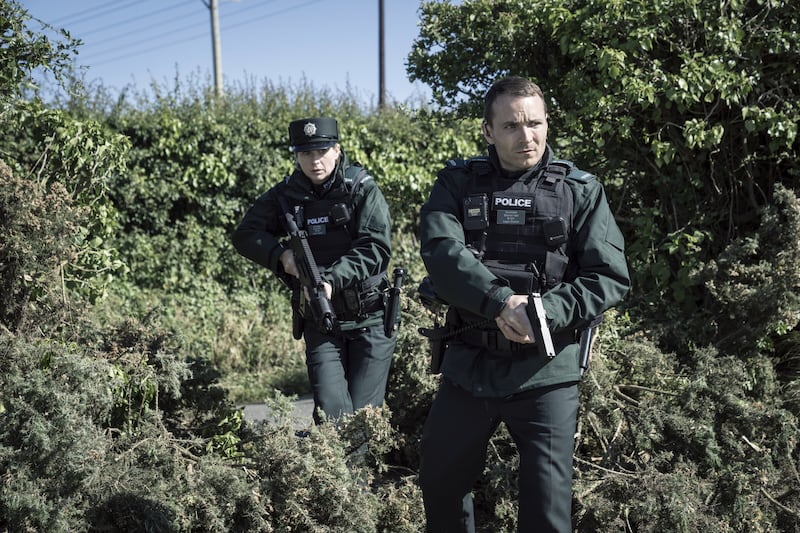
Speaking about what attracted him to Blue Lights, Belfast-born actor Martin McCann (The Survivalist, The Pacific) explains it was the authenticity of the writing by fellow locals Lawn and Patterson and their writers' room collaborators like Derry screenwriter Louise Gallagher, Derry crime novellist Claire Allen and Dublin-born screenwriter Fran Harris.
"The dialogue just rolled off the tongue," he enthuses.
"Usually, you get a script about here and you're always going, 'but we wouldn't say it like that'. But obviously these two guys [Lawn and Patterson] are from here and know here quite well. So, it felt very 'Northern Irish', but with 'international' themes: romance, family issues, work stress and life balance.
"The scripts were so well crafted, clever and funny, but also really deep. It gets heavy when you’re not expecting it and it’s funny when you’re not expecting it. Your emotions are see-sawing and being pulled left and right the whole time."
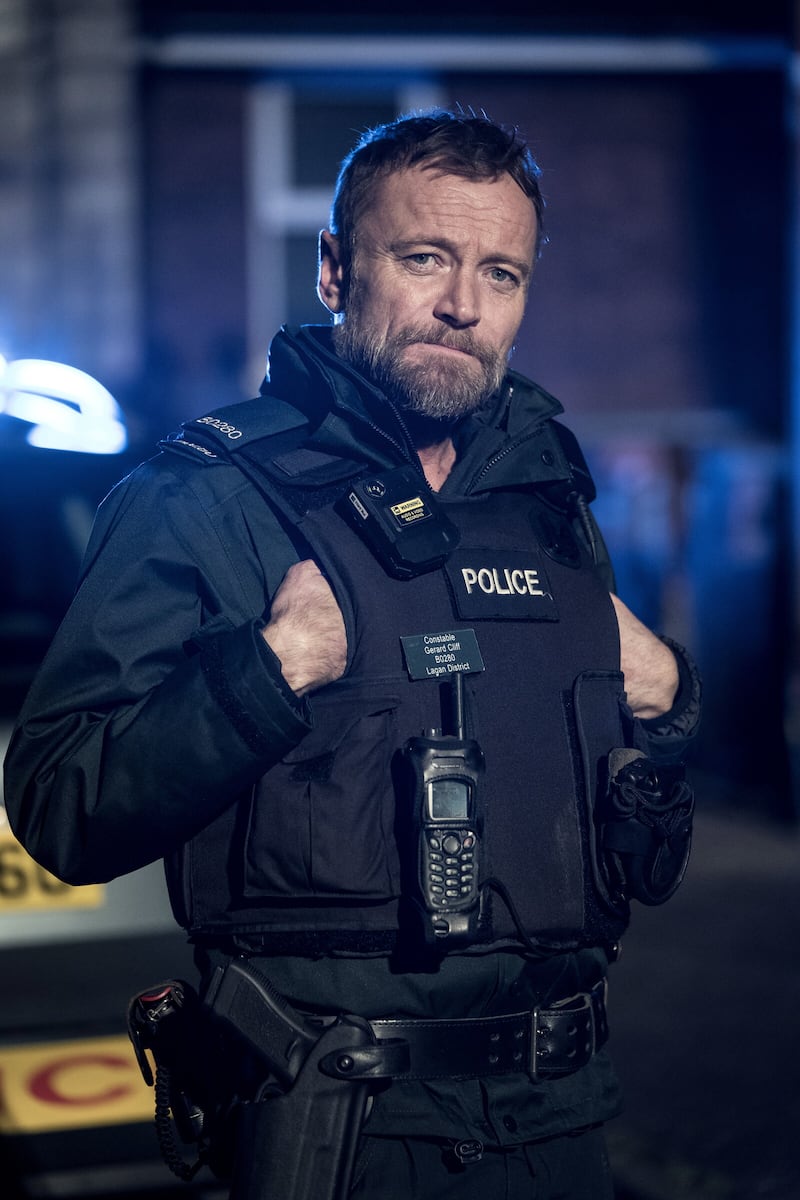
Lisburn-born actor Richard Dormer (Game of Thrones, Fortitude) immediately clicked with his character, Gerry, a long-serving street cop with a quick, dry wit and a heart of gold belied by his sarcastic veneer.
"I just liked him," he offers.
" If anybody remembers [classic 1980s US cop show] Hill Street Blues, there was a character called Renko who was one of the older cops. He was a Texan and a bit of a rebel, but he was also a great cop and sort of the 'morale' for the rest.
"I think [Gerry] is a real 'character', and also maybe the nicest guy I've ever played. He's just a good guy - so that was a challenge for me to play."
Much like her Camogie-loving character Annie's on-screen experience with policing, Blue Lights was very much a 'sink or swim' experience for Katherine Devlin (The Dig) as it's the Royal Welsh College of Music & Drama graduate's first major television role.
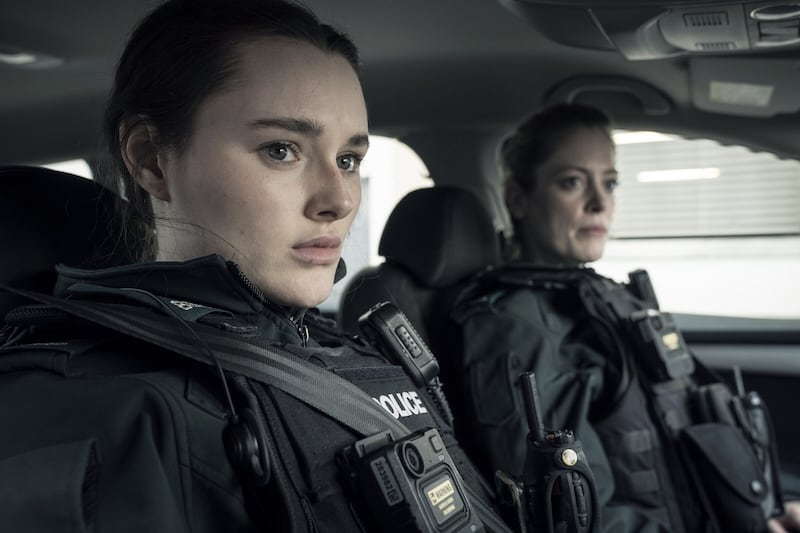
"It was definitely 'in at the deep end', but in the best of ways, "she enthuses.
"I am a bit of a right side of the brain thinker, so I love to be immersed in loads of dialogue and the character's psyche and things like that. But with the other aspect of filming, which is the stunts and the technicality and the continuity, I'm still getting there."
West Midlands-born Sian Brooke, whose father was a policeman, says that filming in the north for the first time with Blue Lights was "just the best experience".
"I never worked here before, but I totally fell in love with Belfast," she says.
"I think the reason is because I just met the best people and they always had great chat. I'm from the Midlands, but I've been down in London for many years and I think I'd forgotten the art of good chat."
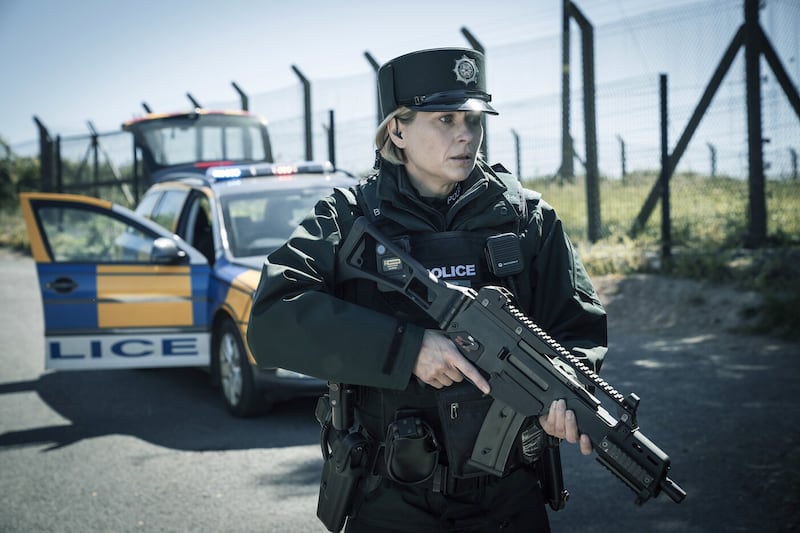
As for the appeal of the show itself, as the daughter of a real police officer, Brooke says she recognised the realism of its portrayal of the work/family dynamic.
"It sort of pulls back the curtain on what it is to do that job. Seeing my dad coming back from whatever he would have been going through that day, and the transition from being at work to being at home - I think it's really true and real in this.
"It's given me a different sort of perspective - now I can reflect and go, 'Jesus Christ'. I don't think I took it on board at the time, what he was dealing with."
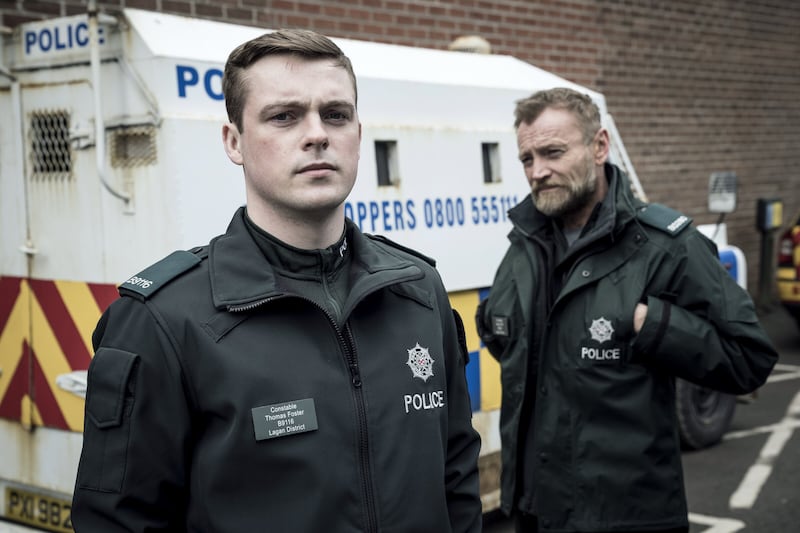
Speaking directly about the impact of the murder attempt on DCI John Caldwell in the run up to Blue Lights making its debut, Declan Lawn admits it gave the creative team behind the show pause for thought.
"As soon as it happened, I suppose because Adam and I had been immersed in this world for a couple of years, it just really, really hit home.
"But I also think there was a different type of shock depending on how old you are: I was shocked, because I remembered stuff like that. And my teenage daughters were shocked because they'd never heard of anything like it.
He adds: "So I hope people think that it's actually kind of an apposite time for a show like this to come out."
:: Blue Lights starts Monday March 27 at 9pm on BBC One and will air weekly. All six episodes will become available on iPlayer once episode one has aired.



